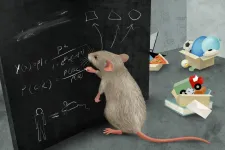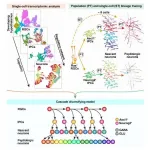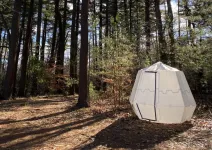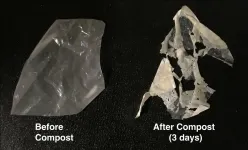Simplifying our world
Mice master complex thinking with a remarkable capacity for abstraction
2021-04-21
(Press-News.org) Categorization is the brain's tool to organize nearly everything we encounter in our daily lives. Grouping information into categories simplifies our complex world and helps us to react quickly and effectively to new experiences. Scientists at the Max Planck Institute of Neurobiology have now shown that also mice categorize surprisingly well. The researchers identified neurons encoding learned categories and thereby demonstrated how abstract information is represented at the neuronal level.
A toddler is looking at a new picture book. Suddenly it points to an illustration and shouts 'chair'. The kid made the right call, but that does not seem particularly noteworthy to us. We recognize all kinds of chairs as 'chair' without any difficulty. For a toddler, however, this is an enormous learning process. It must associate the chair pictured in the book with the chairs it already knows - even though they may have different shapes or colors. How does the child do that?
The answer is categorization, a fundamental element of our thinking. Sandra Reinert, first author of the study explains: "Every time a child encounters a chair, it stores the experience. Based on similarities between the chairs, the child's brain will abstract the properties and functions of chairs by forming the category 'chair'. This allows the child to later quickly link new chairs to the category and the knowledge it contains."
Our brain categorizes continuously: not only chairs during childhood, but any information at any given age. What advantage does that give us? Pieter Goltstein, senior author of the study says: "Our brain is trying to find a way to simplify and organize our world. Without categorization, we would not be able to interact with our environment as efficiently as we do." In other words: We would have to learn for every new chair we encounter that we can sit on it. Categorizing sensory input is therefore essential for us, but the underlying processes in the brain are largely unknown.
Mice categorize surprisingly well
Sandra Reinert and Pieter Goltstein, together with Mark Hübener and Tobias Bonhoeffer, group leader and director at the Max Planck Institute of Neurobiology, studied how the brain stores abstract information like learned categories. Since this is difficult to investigate in humans, the scientists tested whether mice categorize in a way similar to us. To do so, they showed mice different pictures of stripe patterns and gave them a sorting rule. One animal group had to sort the pictures into two categories based on the thickness of the stripes, the other group based on their orientation. The mice were able to learn the respective rule and reliably sorted the patterns into the correct category. After this initial training phase, they even assigned patterns of stripes they had not seen before into the correct categories - just like the child with the new book.
And not only that: when the researchers switched the sorting rules, the mice ignored what they had learned before and re-sorted the pictures according to the new rule - something we humans do all the time while learning new things. Therefore, the study demonstrates for the first time to what extent and with which precision mice categorize and thereby approach our capacity for abstraction.
Neurons gradually develop a category representation
With this insight, the researchers were now able to investigate the basis of categorization in the mouse brain. They focused on the prefrontal cortex, a brain region which in humans is involved in complex thought processes. The investigations revealed that certain neurons in this area become active when the animals sort the striped patterns into categories. Interestingly, different groups of neurons reacted selectively to individual categories.
Tobias Bonhoeffer explains: "The discovery of category-selective neurons in the mouse brain was a key point. It allowed us for the first time to observe the activity of such neurons from the beginning to the end of category learning. This showed that the neurons don't acquire their selectivity immediately, but only gradually develop it during the learning process."
Category-selective neurons are part of long-term memory
The scientists argue that the category-selective neurons in prefrontal cortex only play a role once the acquired knowledge has been shifted from short-term to long-term memory. There, the cells store the categories as part of semantic memory - the collection of all factual knowledge. In this context, we should keep in mind that the categories we learn are the brain's way to make our world simpler. However, that also means that those categories are not necessarily 'right' or correctly reflect reality.
By investigating category learning in the mouse, the study adds important details to the neuronal basis of abstract thinking and reminds us that complex thoughts are not only reserved for us humans.
INFORMATION:
Original publication
Sandra Reinert, Mark Hübener, Tobias Bonhoeffer, Pieter M. Goltstein
Mouse prefrontal cortex represents learned rules for categorization
Nature, online April 21, 2021
[Attachments] See images for this press release:

ELSE PRESS RELEASES FROM THIS DATE:
2021-04-21
Central Africa is home to the world's second-largest area of dense tropical rainforest. This major reservoir of biodiversity stretches out over five main countries: Cameroon, Gabon, the Republic of Congo, the Democratic Republic of Congo and the Central African Republic. It provides numerous ecosystem services, such as regulating exchange cycles between the earth and the atmosphere, and helps to ensure food supply for local populations. Due to the threats from climate change and demographic pressure expected in Africa by the end of the 21st century, the protection and sustainable management of these forests is a challenge for policy ...
2021-04-21
The disastrous consequences of climate "tipping points" could be averted if global warming was reversed quickly enough, new research suggests.
Once triggered, tipping points may lead to abrupt changes such as the dieback of the Amazon rainforest or melting of major ice sheets.
Until now, crossing these thresholds has been assumed to be a point of no return, but the new study - published in the journal Nature - concludes that thresholds could be "temporarily exceeded" without prompting permanent shifts.
The research team, from the University of Exeter and the UK Centre for Ecology and Hydrology (UKCEH), say the time available to act would depend on the level ...
2021-04-21
Scientists have provided the first evidence to show that eradicating rats from tropical islands effects not just the biodiversity on the islands, but also the fragile coral seas that surround them.
The new study led by scientists at Lancaster University and published in the journal Current Biology shows that critical cycles of seabird nutrients flowing to coral reefs are re-established within relatively short time periods after rats are removed - even around islands that have been infested for hundreds of years.
The findings offer encouragement that rat eradication can benefit coral ...
2021-04-21
What The Study Did: Researchers looked at whether short-term exposure to air pollution from a 2018 California wildfire was associated with changes in the number of clinic visits for eczema or itch and medications prescribed for eczema.
Authors: Maria L. Wei, M.D., Ph.D., of the University of California, San Francisco, is the corresponding author.
To access the embargoed study: Visit our For The Media website at this link https://media.jamanetwork.com/
(doi:10.1001/jamadermatol.2021.0179)
Editor's Note: The article includes conflicts of interest and funding/support disclosures. Please see the article for additional information, including other authors, author contributions and affiliations, conflict of interest and financial disclosures, ...
2021-04-21
Wildfire smoke can trigger a host of respiratory and cardiovascular symptoms, ranging from runny nose and cough to a potentially life-threatening heart attack or stroke. A new study suggests that the dangers posed by wildfire smoke may also extend to the largest organ in the human body, and our first line of defense against outside threat: the skin.
During the two weeks in November 2018 when wildfire smoke from the Camp Fire choked the San Francisco Bay Area, health clinics in San Francisco saw an uptick in the number of patients visiting with concerns of eczema, also known as atopic dermatitis, and general itch, compared to the same time of the year ...
2021-04-21
A mechanistic understanding of brain development requires a systematic survey of neural progenitor cell types, their lineage specification and maturation of postmitotic neurons. Cumulative evidences based on single-cell transcriptomic analysis have revealed the heterogeneity of cortical neural progenitors, their temporal patterning and the developmental trajectories of excitatory and inhibitory neurons in the developing neocortex. Nevertheless, the developmental hierarchy of the hypothalamus, which contains an astounding diversity of neurons that regulate endocrine, autonomic and behavioral functions, has not been well understood.
Recently, however, Prof. WU Qingfeng's ...
2021-04-21
WHO Peter Libby, MD, cardiovascular medicine specialist at Brigham and Women's Hospital and the Mallinckrodt Professor of Medicine at Harvard Medical School; author of a new review paper published in Nature.
WHAT Atherosclerosis -- hardening of the arteries -- is now involved in the majority of deaths worldwide, and advances in our understanding of the biology of the disease are changing traditional views and opening up new avenues for treatment.
The picture of who may be at risk for a heart attack has evolved considerably in recent decades. At one time, a heart attack might have conjured up the image of a middle-aged white man with high cholesterol and high blood pressure who smoked cigarettes. Today, traditional concepts of what contributes to risk have changed. These ...
2021-04-21
In 2016, an inflatable arch wreaked havoc at the Tour de France bicycle race when it deflated and collapsed on a cyclist, throwing him from his bike and delaying the race while officials scrambled to clear the debris from the road. Officials blamed a passing spectator's wayward belt buckle for the arch's collapse, but the real culprit was physics.
Today's inflatable structures, used for everything from field hospitals to sporting complexes, are monostable, meaning they need a constant input of pressure in order to maintain their inflated state. Lose that pressure and the structure ...
2021-04-21
What is the cost of 1 ton of a greenhouse gas? When a climate-warming gas such as carbon dioxide or methane is emitted into the atmosphere, its impacts may be felt years and even decades into the future - in the form of rising sea levels, changes in agricultural productivity, or more extreme weather events, such as droughts, floods, and heat waves. Those impacts are quantified in a metric called the "social cost of carbon," considered a vital tool for making sound and efficient climate policies.
Now a new study by a team including researchers from Lawrence Berkeley National Laboratory (Berkeley Lab) ...
2021-04-21
Despite our efforts to sort and recycle, less than 9% of plastic gets recycled in the U.S., and most ends up in landfill or the environment.
Biodegradable plastic bags and containers could help, but if they're not properly sorted, they can contaminate otherwise recyclable #1 and #2 plastics. What's worse, most biodegradable plastics take months to break down, and when they finally do, they form microplastics - tiny bits of plastic that can end up in our oceans, fish, and even our bodies.
Now, as reported in the journal Nature, scientists at the Department ...
LAST 30 PRESS RELEASES:
[Press-News.org] Simplifying our world
Mice master complex thinking with a remarkable capacity for abstraction





